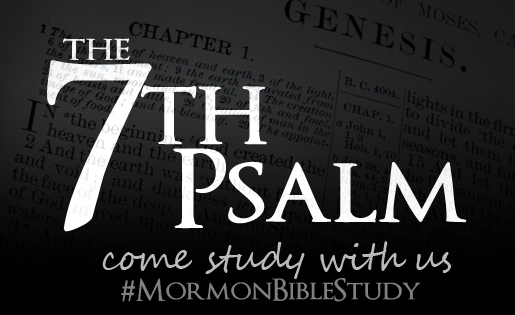When I posted the quote art for the first verse on Facebook, I made a typo - if you look, it's edited, because I typed "In Thee will I put my trust". But that's not what the first verse says.
"O Lord my God, in thee DO I put my trust"
I'm glad I made the mistake, because it made me really see that little word. The difference between "I do trust" and "I will trust" is important: it's the difference between a current, active choice to trust God RIGHT NOW, and a more flimsy, unspecified future trust. RIGHT NOW is when things are hard. But I choose to trust anyway. RIGHT NOW things don't make sense. But I trust the Lord to make it right. RIGHT NOW I choose to act on that trust. Do means an active use of agency in the present tense. Do means that the peace of mind the Lord offers us is available to us -- RIGHT NOW.
Trust Scripture Chain
Psalms 7:1
Proverbs 3:5-6
Psalms 125:1
2 Nephi 22:2
D&C 84:116
I had to work a lot harder at understanding the rest of the chapter. Initially, it just struck me as so... harsh. I had to really work at seeing anything but that, at first.
O Lord my God, if I have done this; if there be iniquity in my hands; If I have rewarded evil unto him that was at peace with me; (yea, I have delivered him that without cause is mine enemy:)Let the enemy persecute my soul, and take it; yea, let him tread down my life upon the earth, and lay mine honour in the dust. -Psalm 7:3-5
Persecute me; kill me; trash my good name. This is serious stuff!
But, look: "If there be iniquity in my hands..." and, "If I have rewarded evil to him that was at peace with me..." This isn't random harshness, this is a recognition and acceptance of the unyielding demands of Justice. It's saying, "If I do evil, let evil be done to me."
This is a Psalm about Justice. And the Psalmist understands the different faces of Justice better than I do. Our culture enthrones Corianton's misunderstanding of Justice, and tries to depict it as virtue.
"...for ye do try to suppose that it is injustice that the sinner should be consigned to a state of misery." -Alma 42:1
If I'm honest with myself, the essence of my issue comes from discomfort with the just demand that penalties earned be carried out. The Law of the Harvest can be uncomfortable because it means that when we don't "plant", or we neglect our "garden", we have no right to expect to reap the rewards - whatever they might have been. It's not an at all comfortable principle, when you get right down to it. I've been aware for quite some time now that personal responsibility is, culturally, quite unpopular, but it's still disconcerting to discover myself having such a difficult time with scripture because of the unyielding nature of Justice. So I started pondering Justice. I think there is a tendency to consider Justice as only an obstacle to be overcome by the Lord's Grace, but if that's all the further we look, we miss an essential aspect of the character of God. I've come to think there's more to it than just penalties, though penalties are definitely part of the equation. But consider:
...he doth require that ye should do as he hath commanded you; for which if ye do, he doth immediately bless you; and therefore he hath paid you...
-Mosiah 2:24
God has promised to bless us when we do right. It is, therefore, Just that He should keep His word. This is, at least in part, the source of the trust the Psalmist opened with: the unflinching, unerring Justice of God requires that both penalties and rewards be given as deserved, each and every time. Knowing that God is perfectly just enables us to trust Him in a number of ways: we can trust that we we do well, He will bless us. We can trust that if we rebel, the consequences will come. If we are lazy, industrious, kind, cruel, and so on, we will reap the rewards.
It is joy to the just to do judgment: but destruction shall be to the workers of iniquity. -Proverbs 21:15
Like day following night, so come the consequences for our actions. For better or worse, we get what we choose. Even Christ's mercy is applied under principles of Justice: we choose whether or not to permit the Lord to assist us - and reap the consequences of that choice, too.
The Lord shall judge the people: judge me, O Lord, according to my righteousness, and according to mine integrity that is in me.Oh let the wickedness of the wicked come to an end; but establish the just: for the righteous God trieth the hearts and reins.
Justice Scripture Chain
Psalm 7: 8-9
Alma 42:1
Mosiah 2:24
Proverbs 21:15
Alma 13:3-4





No comments:
Post a Comment